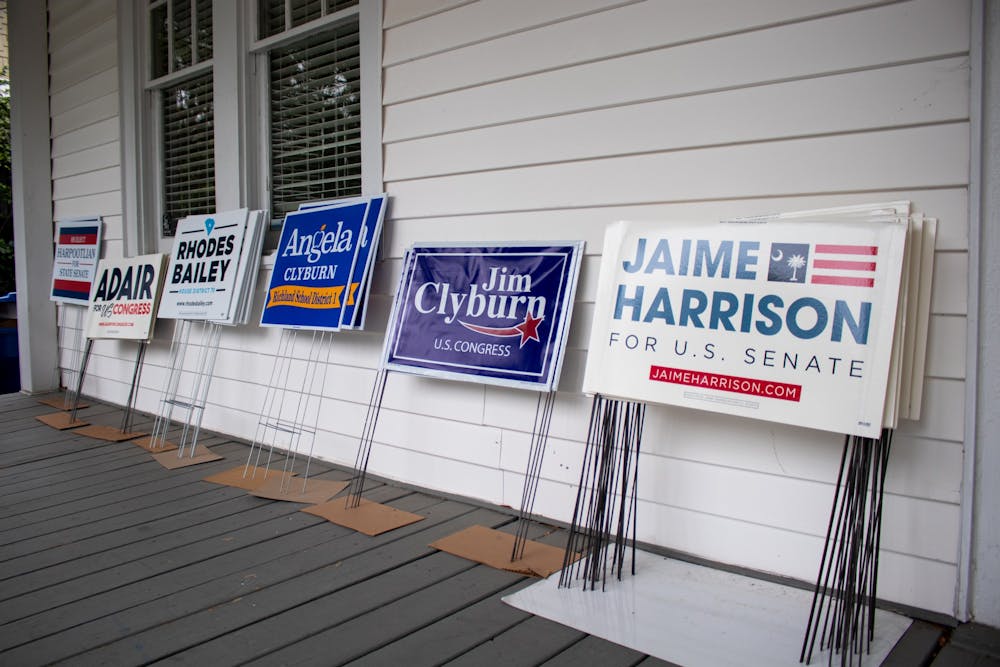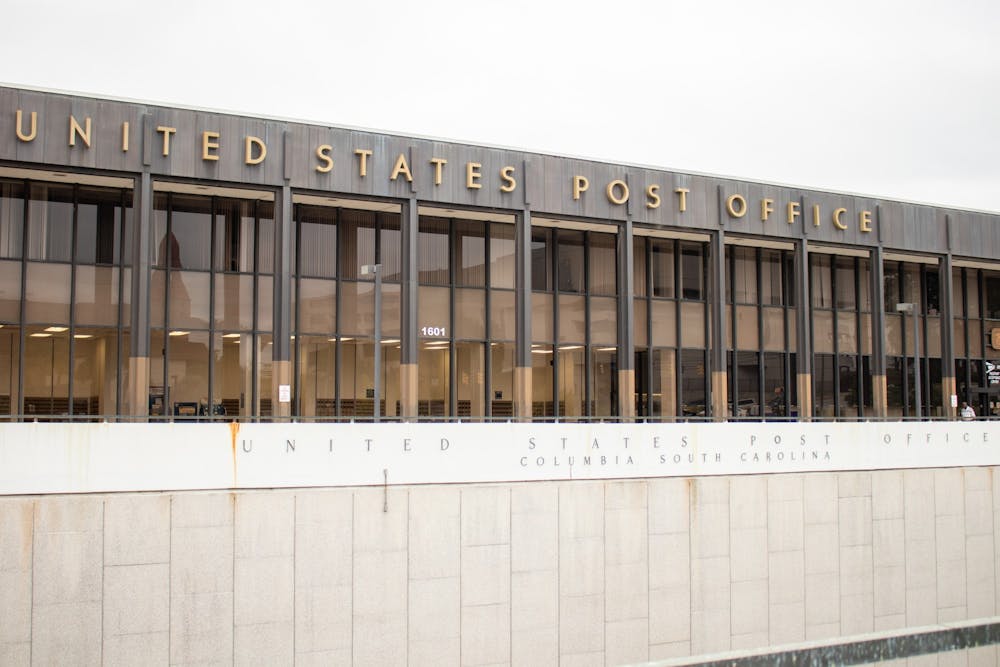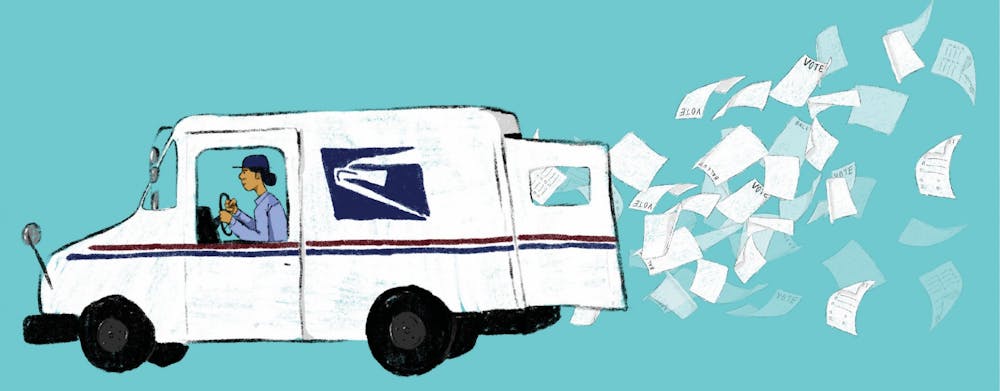2020 will be many UofSC students’ first general election. This, on its own, would make the situation stressful—am I registered? Can I arrange to go back home to vote at a local polling place? Do I personally want to participate in this election, or vote for either of the candidates?—but circumstances have made the 2020 presidential election in particular even more daunting. Federal health officials and concerned citizens are divided on whether in-person voting is safe enough, or necessary enough, to justify the COVID-19 risk. The restructuring of the United States Postal Service has seen news outlets and social media splattered with reports of overworked postal workers, pictures of tiny sorting desks managing mountains of envelopes, and news bulletins about lost packages on the sides of roads.
Mail-in absentee voting is an attractive option to many. Not only does it appeal to at-risk voters concerned about COVID-19 infection at their local precincts but also to out-of-state college students who may be registered far from their school housing and don’t want to make arrangements for travel. To that end, as of September 16, South Carolina’s COVID-19 absentee expansion bill allows all South Carolina voters to cast an absentee ballot for November’s general election. Governor McMaster calls it a “common sense” measure and wants to ensure that South Carolina conducts a safe election. Absentee is an option for in-state students. But, with the mayhem at the USPS and no small amount of confusion about absentee voting, can first-time voters be sure that the office transporting their ballots and the office counting those ballots is going to represent their wishes?

These are critical issues. Not only will the choice between Trump or Biden shape national policy on the environment, the government’s response to police violence and social movements, COVID-19 and the USPS, but Senator Lindsey Graham's (R-SC) Senate race is hotly contested with newcomer Jaime Harrison. It is essential that nothing goes wrong and that as many votes as possible be accounted for.
I sat down with two people intimately involved with Richland County’s voting processes: Eaddy Roe Willard, the chairwoman of the Richland County Republican Party, and Pete Kennedy, a former poll clerk and colleague of Willard’s, who now spends time advocating for voting and political participation.
There’s a risk of partisan bias here; indeed, my original goal in talking to Mrs. Willard was to interview her and the Richland County Democratic Party’s chairman separately, to establish the different local parties' stances on the state of the USPS. However, the Richland County Democratic Party’s chairman's office never responded to requests for an interview. But, not only did Mrs. Willard lead me to Mr. Kennedy, who is uniquely experienced with absentee voting in Richland County’s elections, she convinced me along with him that wanting votes counted is a bipartisan initiative.
Vocabulary
It’s worth establishing the differences in the terms used for non-standard voting because the two are concerned with how some not-the-same processes are talked about interchangeably:
All-mail voting is conducted in only a handful of U.S. states: Colorado, Utah, Washington, Hawaii, and Oregon. In these states, ballots are sent out to all eligible voters by mail based on an existing voter database maintained by the state.
Absentee voting requires voters to request an absentee ballot, fill out the ballot, and return the ballot by mail or polling place drop-off in time. Nothing is automatically sent out and it falls on the voter to ensure their ballot arrives. Absentee voting, depending on the state, may or may not need a witness: a third party, anyone, who can sign the ballot and authorize that the voter filled out their requested ballot and only theirs. In South Carolina, this is in flux. As of October 2, 2020, a witness is not required, but election officials concerned about voter fraud are escalating the issue to the U.S. Supreme Court. Absentee can also be in-person, allowing people to place their votes early at special “absentee precincts.”

The USPS
Postmaster General Louis DeJoy’s changes to the U.S. Postal Service include banning the use of overtime and extra trips for mail delivery and the gradual removal of some mail sorting machines and collection boxes with the promise that these changes would be more efficient in the long run. These changes are amid concern that DeJoy’s holdings in a USPS-affiliated company might be a conflict of interest, and that his goal of making the USPS eventually profitable is at best a lost cause and at worst unnecessary.
As Republicans interested in a smaller, more efficient federal government, Willard and Kennedy found themselves agreeing with some of the changes made to “streamline” the Postal Service.
“I feel like it was trying to be made political, versus really being standard operating procedure,” Willard said. “I mean, [DeJoy] … he was also a logistics expert, dealing with worldwide logistics, and when you think about the way things have changed in the past twenty to thirty years, in terms of how our mail is both delivered and sent out, why do we need boxes on every corner … when most people, if they have mail to be sent out, they put it in their own mailbox?”
“I don’t feel like that will affect anything, in terms of our elections. I think they were simply trying to make the post office more efficient, and—I don’t mean, ‘waste money,’ but these are taxpayer dollars and the postal service has been running at a deficit for many years.”
The chairwoman also argued that there are measures for oversight, as far as DeJoy’s efforts to streamline the USPS go. The U.S. Senate’s Homeland Security and Governmental Affairs Committee has oversight over the postal service, though the Democrat-majority House of Representatives hasn’t had a dedicated postal committee since 1995—making the oversight on a national level undeniably partisan.
The two also admit that it is risky of the postal service to introduce these changes so soon before a presidential election—if only because it makes a convenient excuse for any political party to cast doubts on an election’s outcome.
For those concerned that their mail-in absentee vote will get lost by some misfortune, in-person absentee voting is still an option, as is dropping an absentee ballot at a polling place drop-off. If a situation arises where an absentee ballot never reaches a voter, or there are errors with their registration, they can appeal for a provisional ballot. There, local election officials will review their case and determine whether or not to count their vote.
Anti-Fraud Measures
Former poll clerk Pete Kennedy was upfront about the fact that absentee voting carried an “unavoidable risk for fraud.” Put simply, he told me, the poll clerks who receive mail-in and absentee ballots have no way of knowing whether a ballot was filled out fraudulently and the system depends on some degree of trust in voters. That said, whether the budget of the USPS was halved or doubled, mail-in voting wouldn’t become any more or less trustworthy, he assured me. The postal service just delivers the ballots and the inherent risk of voter fraud is an altogether separate issue.
However, state election commissions take steps to avoid fraud—and, more often, paperwork or logistical errors by sleep-deprived clerks—where possible. Absentee voting, just like traditional voting at a precinct, can be overseen by poll watchers—citizens appointed by candidates to make sure fraud does not occur during the voting process. Instead of watching the polls in-person, these poll watchers monitor the county clerks who count and process the ballots. On top of this, some ballot-sorting operations conduct cross-checking, to make sure no exhausted clerks are making mistakes (such as incorrectly transcribing a damaged ballot) without oversight.
Even with what they can’t help, Kennedy says, voter fraud is rare and occurs at a level so small that it’s unlikely to sway a national election. Instead, the real risk is in local elections, for mayors or sheriffs or city council members, where a dozen votes or less can make the difference between winner and loser.
Still not convinced, or concerned about voter suppression? Pete Kennedy invites you to volunteer at a local polling place and ensure the quality yourself. And if you’re convinced that your vote is systematically not being counted, place a write-in vote for an obscure person or fake candidate name. If you’re the only person who wrote that exact name in, you’ll see your single vote reported in the results. But a voice for participation above all else, Kennedy reminds you and me both:
“Vote. None of this matters if you don’t vote.”
Resources
Visit SCVote.org for information about polling places and requesting absentee ballots for upcoming elections.



